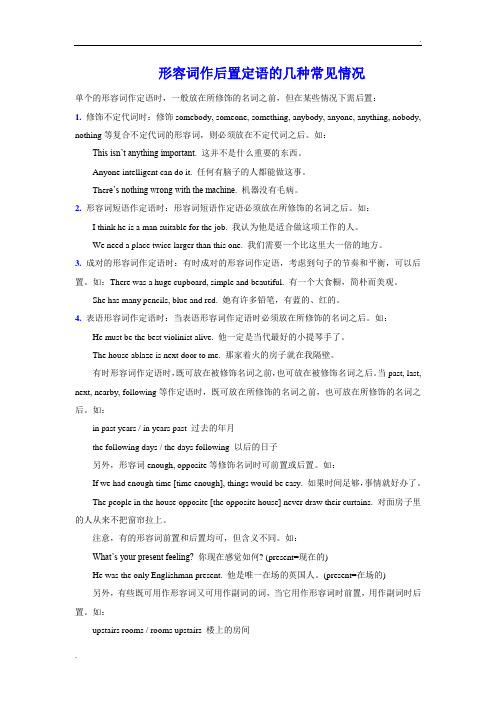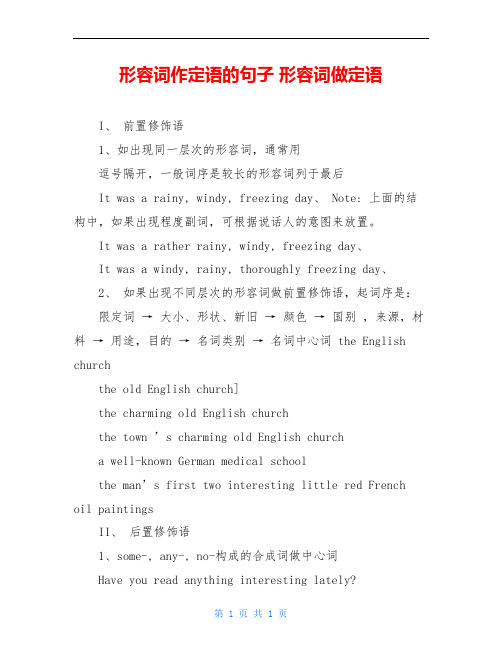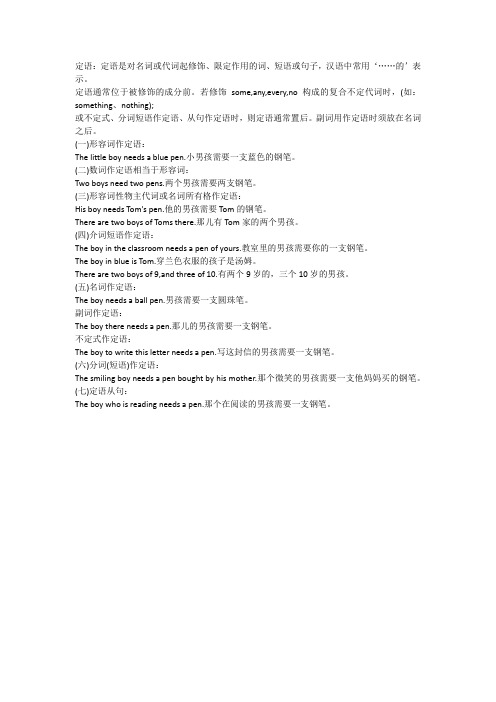形容词作定语的句子 形容词做定语
形容词作后置定语的几种常见情况

形容词作后置定语的几种常见情况单个的形容词作定语时,一般放在所修饰的名词之前,但在某些情况下需后置:1. 修饰不定代词时:修饰somebody, someone, something, anybody, anyone, anything, nobody, nothing等复合不定代词的形容词,则必须放在不定代词之后。
如:This isn’t anything important. 这并不是什么重要的东西。
Anyone intelligent can do it. 任何有脑子的人都能做这事。
Ther e’s nothing wrong with the machine. 机器没有毛病。
2. 形容词短语作定语时:形容词短语作定语必须放在所修饰的名词之后。
如:I think he is a man suitable for the job. 我认为他是适合做这项工作的人。
We need a place twice larger than this one. 我们需要一个比这里大一倍的地方。
3. 成对的形容词作定语时:有时成对的形容词作定语,考虑到句子的节奏和平衡,可以后置。
如:There was a huge cupboard, simple and beautiful. 有一个大食橱,简朴而美观。
She has many pencils, blue and red. 她有许多铅笔,有蓝的、红的。
4. 表语形容词作定语时:当表语形容词作定语时必须放在所修饰的名词之后。
如:He must be the best violinist alive. 他一定是当代最好的小提琴手了。
The house ablaze is next door to me. 那家着火的房子就在我隔壁。
有时形容词作定语时,既可放在被修饰名词之前,也可放在被修饰名词之后。
当past, last, next, nearby, following等作定语时,既可放在所修饰的名词之前,也可放在所修饰的名词之后。
形容词作定语例子(二)

形容词作定语例子(二)形容词作定语的例子例子1:大型汽车展览•形容词:大型•定语:汽车展览•详细解释:这句话中,“大型”作为形容词修饰后面的名词“汽车展览”,表示展览规模较大。
例子2:美丽的花园•形容词:美丽的•定语:花园•详细解释:形容词“美丽的”用来修饰名词“花园”,表示该花园非常漂亮。
例子3:新鲜的食材•形容词:新鲜的•定语:食材•详细解释:“新鲜的”形容词用来描述名词“食材”,表示食材的品质非常好,刚刚来自于采摘或者购买。
例子4:有趣的故事•形容词:有趣的•定语:故事•详细解释:这句话中,“有趣的”形容词修饰名词“故事”,表示该故事引人入胜,充满趣味。
例子5:聪明的孩子•形容词:聪明的•定语:孩子•详细解释:形容词“聪明的”用于修饰名词“孩子”,表示这个孩子智力非常好。
例子6:高大的建筑•形容词:高大的•定语:建筑•详细解释:这句话中,“高大的”形容词修饰名词“建筑”,表示该建筑高度较为显著。
例子7:健康的生活方式•形容词:健康的•定语:生活方式•详细解释:“健康的”形容词用于修饰名词“生活方式”,表示这种生活方式对身体有益。
例子8:友好的邻居•形容词:友好的•定语:邻居•详细解释:形容词“友好的”用来描述名词“邻居”,表示邻居之间相处融洽,友善。
例子9:快乐的音乐•形容词:快乐的•定语:音乐•详细解释:这句话中,“快乐的”形容词修饰名词“音乐”,表示这种音乐充满欢乐和愉悦。
例子10:晴朗的天气•形容词:晴朗的•定语:天气•详细解释:形容词“晴朗的”修饰名词“天气”,表示天空中阳光明媚,没有云彩。
通过以上例子,我们可以看到形容词作定语可以用来修饰名词,表达名词的性质、特征或状态,丰富了语言表达的方式。
使用形容词作定语可以让描述更加具体生动,帮助读者更好地理解和感受作者想要传达的意思。
英语中形容词作后置定语的十种情况

英语中形容词作后置定语的十种情况1、当形容词修饰由 some-,no-,any和 every-,-thing,-body 和-one构成的不定代词,如something, everything, anything, nothing, somebody, everybody, anybody, nobody, someone, everyone, anyone等时,该形容词要后置。
例如:Every minute there is something exciting going on here.这里每一分钟都有使人兴奋的事情发生。
Everything useful in the house was taken away by him by force.房子里每件有用的东西都被他用武力夺去了。
Have you ever met anyone famous你曾经见过有名的人物吗?I met someone quite talkative at the party.在聚会上我遇到了一位十分健谈的人。
Is there anything important in her article她的文章里有什么重要之处吗?Mary certainly talks a lot and she's never interested in what anyone else has to say.玛丽当然说的太多了,她从来对别人需要说的话不感兴趣。
The doctors have tried everything humanly possible to save his life.医生使用了可能的人道的方法去拯救他的性命。
There is nothing difficult in the world.世上无难事。
There is something wrong with my body. I am not feeling quite myself today.我的身体出问题了,今天我感觉不太好。
可以作后置定语的各种成分

后置定语一、形容词1、形容词修饰由some-, any-, every-, no- 构成的复合不定代词时,只能作后置定语。
如:(1)There is something unusual in her voice.她的声音有些反常。
(2)They provided us with everything necessary.他们向我们提供了各种必需品。
(3)Is there anything important in the paper?报纸上有什么重要消息吗?(4)There is nothing wrong with your words. 你的话没有错。
2、形容词与介词短语、动词不定式短语或其他附加词连用作定语时,需放在所修饰的词之后,作后置定语。
这类词有:easy(容易的)、difficult(困难的)、impossible (不可能)、different(不同的)、similar(类似的)、equal(相等的)、responsible (负责的)、suitable(合适的)、sufficient(充足的)等。
如:(1)It was a conference fruitful of results.这是一个富有成效的会议。
(2)He is one of the leading members responsible for the work.他是负责这项工作的领导之一。
(3)The girl is married to a man greedy for money.那女孩嫁给了一个贪财的人。
(4)English is a language easy to learn but difficult to master.英语是一门易学而难精通的语言。
注:形容词词组作定语时一般后置,但有些则可以部分前置,部分后置,形成名词修饰语不连续的现象。
如:a. They have facilities comparable to ours. 他们有和我们相同的设备。
形容词作定语的句子 形容词做定语

形容词作定语的句子形容词做定语I、前置修饰语1、如出现同一层次的形容词,通常用逗号隔开,一般词序是较长的形容词列于最后It was a rainy, windy, freezing day、 Note: 上面的结构中,如果出现程度副词,可根据说话人的意图来放置。
It was a rather rainy, windy, freezing day、It was a windy, rainy, thoroughly freezing day、2、如果出现不同层次的形容词做前置修饰语,起词序是:限定词→ 大小、形状、新旧→ 颜色→ 国别,来源,材料→ 用途,目的→ 名词类别→ 名词中心词 the English churchthe old English church]the charming old English churchthe town ’s charming old English churcha well-known German medical schoolthe man’s first two interesting little red Frenc h oil paintingsII、后置修饰语1、some-, any-, no-构成的合成词做中心词Have you read anything interesting lately?I’d like something cheaper、2、当修饰语本身带有不定式,介词词组等补足成分是Students pave enough to take the course deserve to succeed、He is a man deserving of sympathy、 It was a conference fruitful of results、 Note: 中心词有以下形容词修饰,如:different, similar, easy, difficult, impossible 是,或者为形容词比较级或最高级,a different book from this onea difficult problem to solvethe best summering place in the world3、同样的形容词做前置修饰语和后置修饰语有时意义不同the members present / the present membersthe person responsible / a responsible personNote:a、 the involved / concerned / interestedparty = the party involved / concerned / interestedb、 the people involved / concerned / interested。
形容词作后置定语

B.个别词也可单独作前置定语。如:aloof(孤零的)、alert(明智的)等。可以说:
a. an aloof building /church /character
孤零零的大楼/教堂/ 孤独的性格
b. an alert manner 明智的行为
现有的雇员人数
b. ① The girl responsible (= who can be blamed) was expelled.
负有责任的那个姑娘被开除了。
② Janet is a responsible girl (= she has a sense of duty).
(6)Anyone intelligent can do it. 任何一个聪明的人都能做到。
二.形容词与介词短语、动词不定式短语或其他附加词连用作定语时,需放在所修饰的词之后,作后置定语。这类词 有:easy(容易的)、difficult(困难的)、impossible(不可能)、different(不同的)、similar(类似的)、 equal(相等的)、responsible(负责的)、suitable(合适的)、sufficient(充足的)等。如:
(6) We are building a socialist country, prosperous and flourishing.
我们正在建设一个繁荣的社会主义国家。
五. 一些特定意义的形容词作定语时,需放在所修饰的词之后, 作后置定语。这类词有:
present (出席的)、absent(缺席的)、proper(适当的、纯粹的)、necessary(必要的)、general(首席的)、 concerned(有关的、焦急的)、involved(有关的、复杂的)、opposite(相对的)、nearby(附近的)、elect(当选 的)、enough (充足的)等。如:
什么是定语

6) The best boy here is Tom. 副词 The school there is a key middle school in our city. 7) He is sitting in the smoking room. V-ing He gave an inspiring speech yesterday. 8) The boy to write his letter is our monitor. 动词不定式 There is nothing to do today. 9) The pen bought by her is made in China. 过去分词 There are five boys left. 10) The girl you will know is Mary. 从句 There are five boys who will play the game.
6. If I had _____ , I’d visit Europe, stopping at all the small interesting places. A. a long enough holiday B. an enough long holiday C. a holiday enough long D. a long holiday enough
4. The _______ is just around the corner and you won’t miss it. A. bicycle’s shop B. bicycle shop C. bicycles shop D. bicycles’s shop 5. A fast food restaurant is the place _____ just as the name suggests, eating is performed quickly. A. which B. where C. there D. what
英语中定语形式

定语:定语是对名词或代词起修饰、限定作用的词、短语或句子,汉语中常用‘……的’表示。
定语通常位于被修饰的成分前。
若修饰some,any,every,no构成的复合不定代词时,(如:something、nothing);或不定式、分词短语作定语、从句作定语时,则定语通常置后。
副词用作定语时须放在名词之后。
(一)形容词作定语:The little boy needs a blue pen.小男孩需要一支蓝色的钢笔。
(二)数词作定语相当于形容词:Two boys need two pens.两个男孩需要两支钢笔。
(三)形容词性物主代词或名词所有格作定语:His boy needs Tom's pen.他的男孩需要Tom的钢笔。
There are two boys of Toms there.那儿有Tom家的两个男孩。
(四)介词短语作定语:The boy in the classroom needs a pen of yours.教室里的男孩需要你的一支钢笔。
The boy in blue is Tom.穿兰色衣服的孩子是汤姆。
There are two boys of 9,and three of 10.有两个9岁的,三个10岁的男孩。
(五)名词作定语:The boy needs a ball pen.男孩需要一支圆珠笔。
副词作定语:The boy there needs a pen.那儿的男孩需要一支钢笔。
不定式作定语:The boy to write this letter needs a pen.写这封信的男孩需要一支钢笔。
(六)分词(短语)作定语:The smiling boy needs a pen bought by his mother.那个微笑的男孩需要一支他妈妈买的钢笔。
(七)定语从句:The boy who is reading needs a pen.那个在阅读的男孩需要一支钢笔。
- 1、下载文档前请自行甄别文档内容的完整性,平台不提供额外的编辑、内容补充、找答案等附加服务。
- 2、"仅部分预览"的文档,不可在线预览部分如存在完整性等问题,可反馈申请退款(可完整预览的文档不适用该条件!)。
- 3、如文档侵犯您的权益,请联系客服反馈,我们会尽快为您处理(人工客服工作时间:9:00-18:30)。
I. 前置修饰语
如出现同一层次的形容词,通常用
逗号隔开,一般词序是较长的形容词列于最后
It was a rainy, windy, freezing day. Note: 上面的结构中,如果出现程度副词,可根据说话人的意图来放置。
It was a rather rainy, windy, freezing day.
It was a windy, rainy, thoroughly freezing day.
如果出现不同层次的形容词做前置修饰语,起词序是
限定词→大小、形状、新旧→颜色→国别,来源,材料→用途,目的→名词类别→名词中心词the English church
the old English church]
the charming old English church
the town ’s charming old English church
a well-known German medical school
the man’s first two interesting little red French oil paintings
II. 后置修饰语
some-, any-, no-构成的合成词做中心词
Have you read anything interesting lately?
I’d like something cheaper.
当修饰语本身带有不定式,介词词组等补足成分是
Students pave enough to take the course deserve to succeed.
He is a man deserving of sympathy. It was a conference fruitful of results. Note: 中心词有以下形容词修饰,如different, similar, easy, difficult, impossible 是,或者为形容词比较级或最高级,
a different book from this one
a difficult problem to solve
the best summering place in the world
同样的形容词做前置修饰语和后置修饰语有时意义不同the members present / the present members
the person responsible / a responsible person Note:
a. the involved / concerned / interested
party=the party involved / concerned / interested b. the people involved / concerned / interested。
